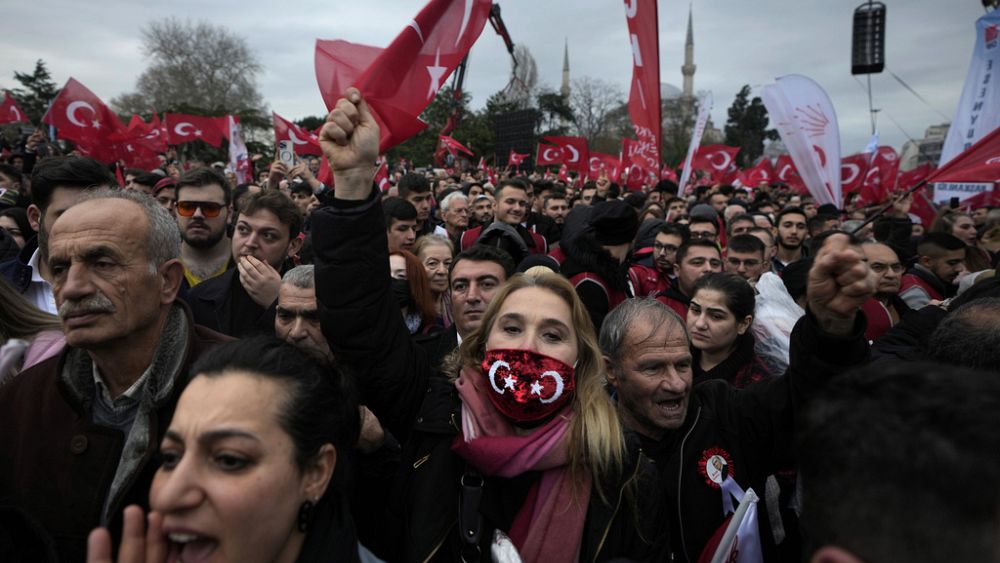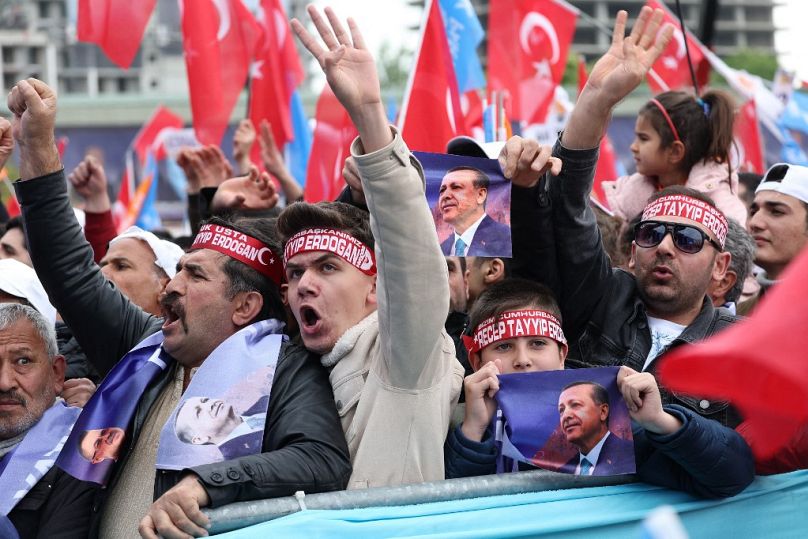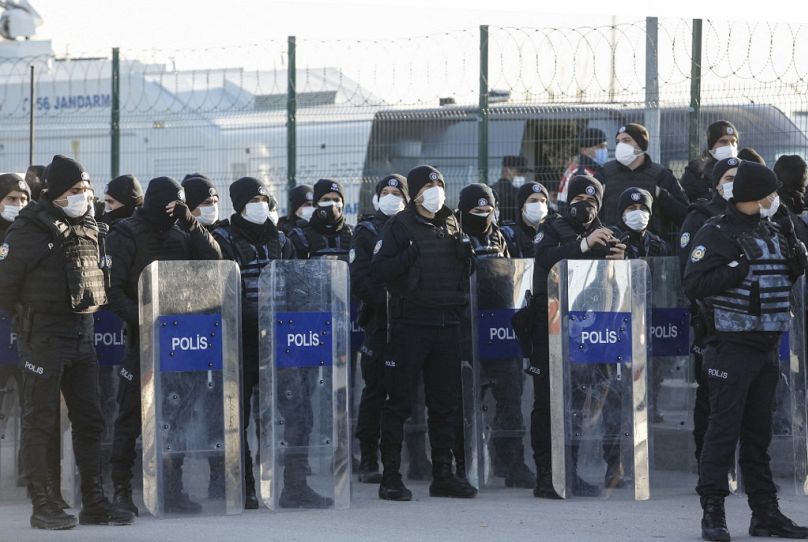
“In an ideal world, we would be able to trust the Turkish government,” said Onur Can Varoğlu. “But we need to make sure the votes being counted in Lithuania end up in Ankara.”
“Anything can happen if we don’t watch.”
The 27-year-old is part of a team of independent volunteers monitoring the vote of Turkish nationals in Lithuania, ahead of Turkey’s nationwide elections on 14 May.
He has volunteered in nearly eight elections, but these in the small Baltic country are special as it is the first time ballots have been set up here. Before, they had to travel to the Turkish border to cast their vote.
Arrested during the Gezi Park protests of 2013, Varoğlu said it was vital to protect the integrity of Turkey’s election, believing democratic freedoms had been eroded back home.
“We are pretty protective of our vote,” he told Euronews. “In Turkey, it is very difficult to protest and we saw how the Middle East went down after the Arab Spring movements.”
“We don’t have hope for a big social movement. Our only chance for change is at the ballot box.”
Turks have been given the opportunity to vote in Lithuania for the first time as their number has risen significantly in recent years, with nearly 2,000 now in the country.
But with the arrival of more Turkish people to the Baltic nation, came the arrival of their political rivalries too.

In Vilnius, the Lithuanian capital, there are reportedly dedicated mosques and cultural centres for supporters of Erdoğan and those of the various opposition forces, such as Kurds and Gülenists, a political group once allied with the Turkish president.
“These political tensions actually play out more abroad because people are freer to express their opinions and do activism,” says Varoğlu. “In Turkey, if you say or do anything too political you can end up in prison.”
Erdoğan has increasingly clamped down on dissent, bringing in controversial laws that criminalise “insulting the president” and “disinformation” on social media.
These political rivalries could be traced back to the family, Varoğlu continued. “It doesn’t matter if you come to Europe. If you are from a nationalist, Islamist background or a more pro-European immigrant one, you bring these values with you.”
“Turkish politics is like football, you are born with your team and will support it no matter what.”
Why are Turkish people in Lithuania?
Over the past decade, Turkey’s economy has hit the rocks, with millions of Turks pushed to the brink by skyrocketing inflation and a collapsing currency.
In September 2021, one US dollar was worth 8 Turkish lira. Today it is 19.5.
These economic headwinds have profoundly impacted which Turks emigrate and where they go.
“The only people who stay in Turkey are those benefiting from the regime. If you are willing to sign up for their agenda and support the party, you will have a bright future. If you don’t want to sacrifice your values to get a good job, then you must leave,” said Varoğlu.
“It’s a given that this is the only way to have a bright future.”
Turkish immigrants in Lithuania tend to be younger, university educated and more supportive of the opposition, compared to the more established Turkish communities in other parts of mainland Europe. However, many still do back Erdoğan.
“Most Turks in hotspots Germany went as guest workers after World War Two. There was no plan to integrate them, so they built their own communities and are stuck in a Turkish fantasy,” said Varoğlu, suggesting this was one reason why diaspora there tended to support Erdoğan.
“But newer generations of immigrants in places like Lithuania are not like that. They’re more open and European.”
In the 2018 elections, 87% (2.63 million) of the Turkish voters registered abroad were residents of 19 EU Member States, the UK, Norway or Switzerland. Almost half of all expat voters in 2018 (47%) were living in Germany, which strongly supported Erdoğan in the last presidential election
One of these younger Turks who will play a pivotal role in the election is Merve Yılmaz.
The 20-something, who cast her vote at the Turkish embassy on Sunday, is studying a master’s at one of Lithuania’s most prestigious universities.
For Yılmaz, the vote couldn’t be more important. Not only was it her first time voting, she has also only ever known Erdoğan, and his AKP party, ruling over Turkey since 2001.
And she is not alone. Five million young people will vote in Turkish elections for the first time this time around, with their support seen as crucial for deciding who will win.
With his stripped-down social media videos, Erdoğan’s rival and leader of an opposition bloc, Kemal Kılıçdaroğlu, has attracted many young voters eager for change. But Erdoğan retains strong support, especially among conservative religious voters.
“To me, it is very clear who should be the next leader,” said Yılmaz. “He [Kılıçdaroğlu] is the only person who we can trust to help lift our country from the horrible situation it is in now.”
“We want change for a better future.”
‘Dictators don’t retire’
Erdoğan is facing the biggest threat to his two-decade rule yet.
His support has taken a battering, with critics accusing him of steering the country towards authoritarianism, ruining the economy and mishandling the response to a devastating earthquake in February that killed more than 50,000 people.
In his defence, the 69-year-old has called the earthquake an act of god, maintaining it is impossible to prepare for such a catastrophic natural disaster on this scale.
Polls predict a neck-and-neck race between Erdoğan and his opponent, with the upcoming vote pitched as a seismic battle over Turkey’s destiny.
There have been widespread fears Erdoğan could not play fairly, while his supporters have threatened to reject the vote if he loses.

“We have a lot of insecurity towards elections being rigged,” said Varoğlu. “We had some bad experiences in the past, but we weren’t as well organised back then.”
After a 2017 referendum on whether to overhaul Turkey’s democracy and establish an executive presidency for Erdoğan – which he won – the opposition cried foul after rules were changed at the last minute to allow 2.5 million unstamped ballots to be included in the vote.
However, Varoğlu was more sure about what was at stake.
“Each candidate is promising two very different futures for Turkey. One of them is promising more restrictions on human rights, more wild nationalism and capitalism. The other is promising improved human rights and a return to European norms.”
“It’s Turkey, anything can happen.”





